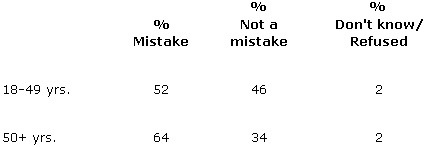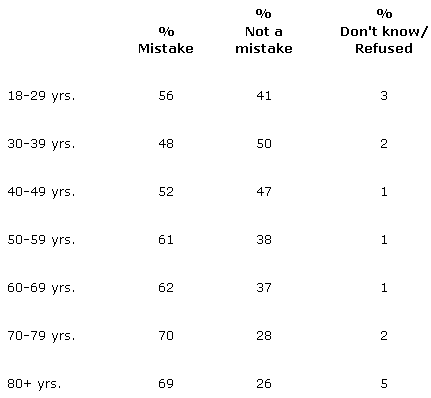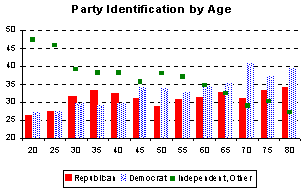Older Americans Most Negative About Iraq War
The latest Gallup survey on attitudes toward the Iraq War found that, despite popular conception that anti-war feelings are strongest among the young, that the over-50 and, especially, over-70 cohort was much more negative.
The finding that party identification mattered most, with 82 percent of Democrats answering “Yes” to the question, “Did the United States make a mistake in sending troops to Iraq?” compared to only 25 percent of Republicans and 59 percent of Independents is not particularly surprising, except perhaps in the size of the divide. The gender gap on this issue is not nearly that large, with 61 percent of women and 53 percent of men in the affirmative column.
The age gap is not as strong as the partisan one but much more unexpected:

A twelve point gap between those above and below the seemingly random age of 50 is interesting. Broken down by life decade, though, the effects are much more meaningful:

Since there are no “why” questions included in the survey, explanation is left to conjecture. Frank Newport‘s guess, though, is the one that immediately came to my mind, so I find it incredibly insightful:
A number of hypotheses could be advanced to explain this age effect, some based on the life experiences of specific age cohorts. Americans who are now in their 50s and early 60s were most likely to have been affected by the Vietnam War, and those who are now in their 70s and 80s were most likely to have been affected by World War II and the Korean War.
I read three or four papers about cohort effects fourteen or fifteen years ago, making me an “expert” by pundit standards but with “just enough knowledge to be dangerous” by political scientist metrics. It stands to reason, however, that the Vietnam generation would be quick to turn against a war, especially an internecine guerrilla campaign in Asia. Further, the WWII cohort is likely to look askance at a conflict that doesn’t measure up to the mythos of the Good War fought by their Greatest Generation.
It’s worth remembering, too, that people over 50 are likely to have children and those over 70 to have grandchildren old enough to fight. Even if their own kids and grandkids didn’t volunteer, they’re likely to see their kids and grandkids in the faces of our soldiers.
By contrast, the under-50 crowd came to adulthood after Vietnam and, more importantly, after the end of the military draft. No man under 50 was ever subject to involuntary service in more than abstract theory. The reason so many college age students were among the war protestors in the 1960s was not that they were so much more idealistic than their 2000s counterparts but because they had skin in the game.
As an aside, this survey had the lowest “Don’t know” responses I can recall. With the exception of the 80+ age cohort in a couple of the breakdowns, the number was 2 percent or under across the board. If nothing else, this is an issue where people have strong views.
UPDATE: Dave Schuler points out that I missed a rather obvious factor: The fact that party ID also corresponds to age cohort. (Indeed, those three or four papers that I read in grad were were about the effects on generational experience on voting behavior. D’oh!) He cites a 2004 Pew study which found, “Older Americans are more Democratic than Republican in their party affiliation, while younger people are about equally divided between the parties. And as has long been true, younger people also are substantially less likely to identify with any political party.” They illustrate this with a rather hard-to-see chart:

Collate the finding with party affiliation by age cohort.
You might also want to consider that those age groups still get most of their information from the traditional media. Is there a newspaper or network news that isn’t negative on the war?
Correlation does not imply causation.
The other useful point from the graph, James, is that independents are increasingly negative about the war in Iraq.
Couple of things.
1. The Independent number is closer to the Democrat figure than the Republican one. So the partisan divide here is Republicans v. Everyone Else.
2. Older Americans I’ve known were far from gung ho about the wars of their era. I think of my parents and grandparents and their friends here. They had a certain satisfaction in how WWII turned out, but much less romanticism about it than the younger, Tim Russert types. How many times have we heard a friend say, “Yeah, my dad would never talk about his experiences in The Big One.” WWII was something to survive for those people. And that generation so turned against the Korean War that they elected Dwight Eisenhower on a peace platform.
In other news, older Americans are likely more negative on just about any subject.
Well, at least they have social security income.
Dave and Jim: No doubt that public sentiment, generally, is moving against the war. I suspect Republicans are only as supportive as they are because the polarized debate about it makes them more reluctant to concede points to the “other team.”
Jim: Fair point on the WWII generation. I think they understood how bloody awful the war was, given the sacrifices they had to make. On the other hand, there was a clear bad guy who remained there the whole time, a clearly defined enemy, and an exit strategy (UNCONDITIONAL SURRENDER) that would easily fit a bumper sticker. Iraq is none of those things even if we somehow pull out something we can call “victory.”
I totally want “civility points” for not having written that the divide was “Republicans v. America!”
😉
I am sure that if we win this war and it is nothing but a footnote in history books. Everyone will claim they were big supporters of it.
I don’t want to hear the B.S. that this war can’t be won. We can win this war with a little backbone and patience. However, whether we have the will and patience is yet to be decided.
Well Wayne, I’m sure you’re sure.
You can’t win a race with no finish line, no matter how long and fast you run.
There seems to be a small bolus of people who lean Republican, and hold policy positions consistent with that, who grew up during the Reagan years. By “growing up” I mean children and teenagers – prone perhaps to imbibing the spirit of the times rather than the realities.
Reagan was the first and second Presidential candidate I voted for, so I don’t know if you’d say I “grew up” with him.
The majority of wars over the last few centuries have been short of total wars with Unconditional Surrender as the exit strategy. Even the Confederate surrender in the American Civil War had explicit and implicit conditions. Grant allowed Lee’s troops to keep their sidearms and ride their own horses home, if I recall correctly. An exit strategy other than Unconditional Surrender is usually a good thing, given the incredible brutality of total war.
Versus the Axis, it was probably justified.
The problem with the present war is that it is more like a campaign against slavery or piracy than a war against a nation-state. We’ve been suppressing piracy for centuries, but pirates are still around. So is slavery in some places. Radical Islam is likely to be around for a very long time, too, and we’d best look on fighting Islamism as a more-or-less permanent state of affairs.
If we look at the much narrower issue of Iraq, the goal at least is clear: A stable government capable of protecting its citizens well enough to have their confidence, and disinclined to threaten its neighbors or support terrorists. The trick knowing when we’ve done this. Ultimately, we can never be sure, since a government that looks stable today might fall tomorrow. But I’m confident we’re not there yet; inclined to believe it’s nonetheless possible, given the right domestic support. Which, unfortunately, does not appear to exist.